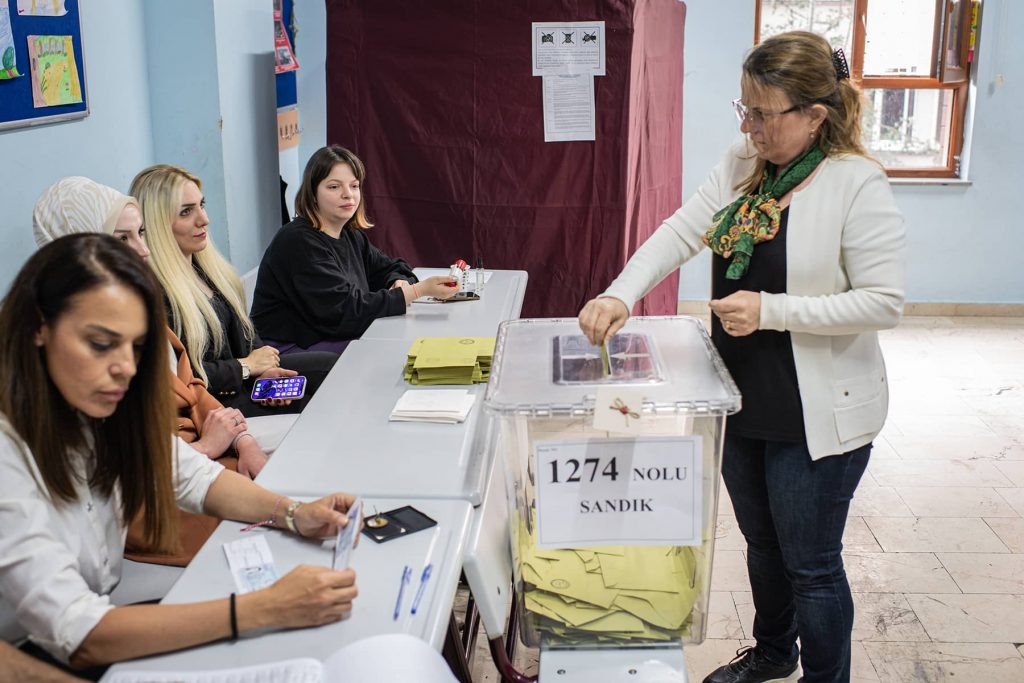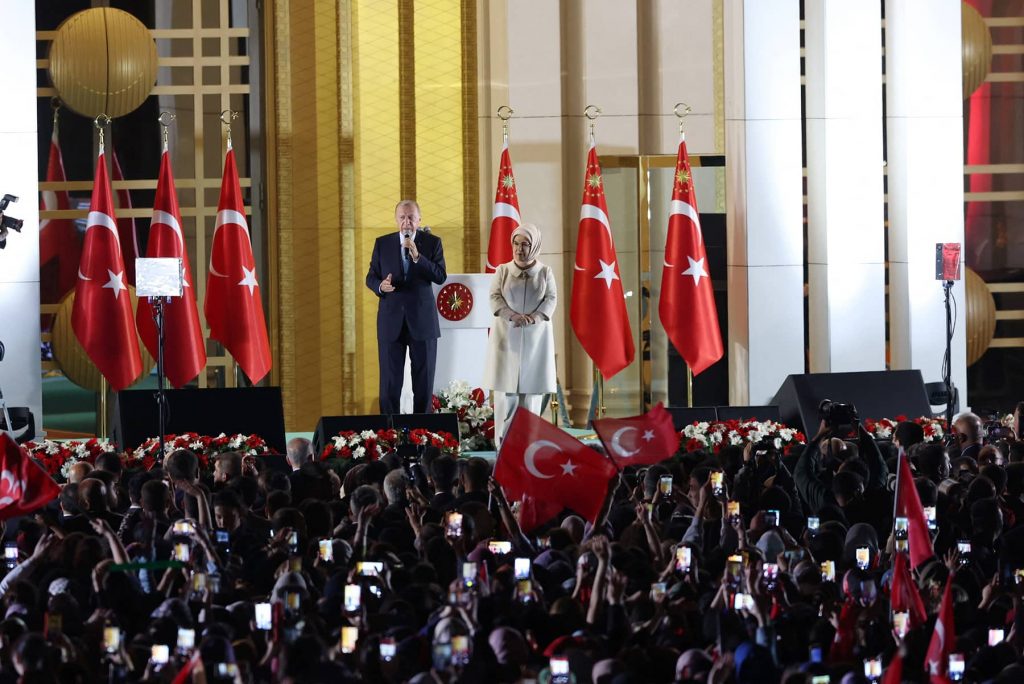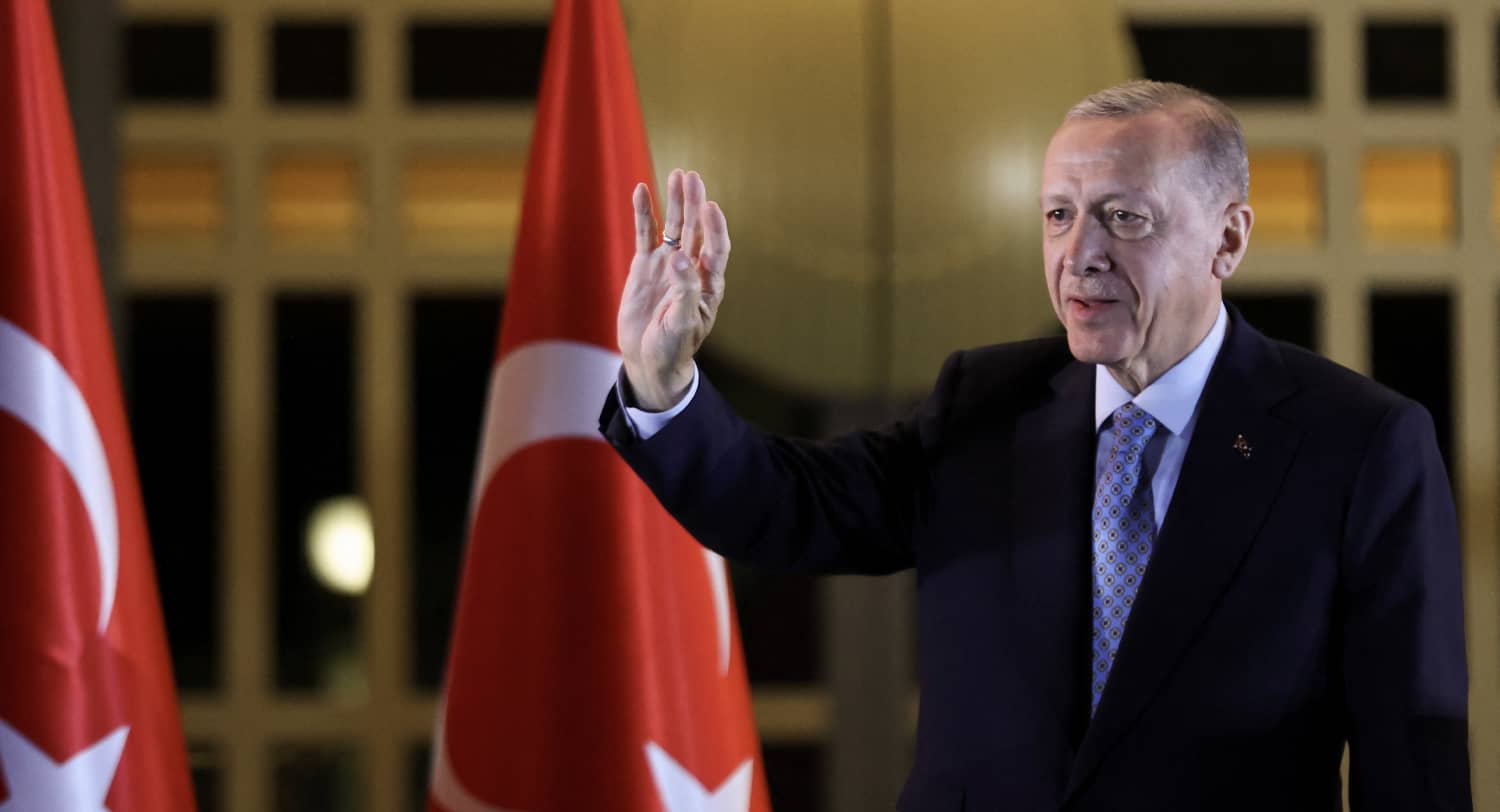The JST asked four experts on Turkey from journalism, academia and government service for their thoughts on “whither Turkey” in the immediate aftermath of the May 28 elections.
In Turkey, “It’s not the economy, stupid”
Alan Makovsky
The run-off elections of May 28 ended with Erdoğan winning roughly 52% of the vote, essentially as was expected after the first round of May 14, when he missed winning an outright majority by just a sliver.
Erdoğan’s success reflects three factors: loyalty of Turkey’s sizable religious community, to whom he has brought equal rights, enhanced status, and a significant measure of prosperity; nationalism both positive (TB2 drone sales and Turkey’s increased diplomatic standing) and negative (shamelessly portraying his center-left opponent Kemal Kılıçdaroğlu as a tool of both Kurdish terrorists and the despised West); and last-minute welfare programs that repeatedly raised the minimum wage and lowered the retirement age, among other government-bestowed benefits. For the majority of voters, this overcame a near-ruinous economy, diminished freedoms, and widespread dissatisfaction with the Erdoğan government’s role in the tragic consequences of the February 6 earthquakes.
Erdoğan’s campaign was his most negatively anti-Western and anti-US ever. Erdoğan is an unpredictable one-man show, but for now it seems likely that Turkey will continue its drift toward Russia and its role as a disruptive force in the Western alliance.
Despite more positive reports to the contrary, it is no certainty that Turkey will ratify Sweden’s NATO bid before the July 11-12 Vilnius summit. Ratification might require a significant Western concession, such as sale to Turkey of upgraded F-16 fighter aircraft. One optimistic possibility suggested by some analysts is that a pragmatic Erdoğan would in the near term turn toward acceptance that salvation for Turkey’s reeling economy lies with the West, not Russia or even the Gulf, and that he must adjust his foreign policy accordingly.
More Autocracy, Continued Transactional Foreign Policy
Ehud Yaari
President Erdoğan will become – I suspect – even more Erdoğan-ish than prior to his re-election. Controversies at the ballot boxes and criticisms of the negative campaign he waged will not diminish Erdoğan’s sense of snatching success from the jaws of defeat, securing both the presidency and an obedient parliament. A catastrophic earthquake, spiraling inflation and the devastating devaluation of the Turkish lira failed to compete with his nationalistic swagger, accompanied by vulgar anti-Kurdish, anti-Alevi and anti-Syrian refugee rhetoric.
I expect Turkey’s leader of the past 21 years to tighten his autocracy, subdue media outlets that haven’t yet fallen under his grip, enforce control over the judiciary and stifle whatever academic freedom is still there. Suppression of Kurdish activism will persist, including jail sentences, as will the removal of elected local officials not in love with him in the big cities. He rules with the backing of the Anatolian mid-size conservative towns and their countryside. Therefore, his Islamist convictions may get even louder.
I don’t expect Turkey’s foreign policy to change. As a transactional leader, Erdoğan is after several deals. With the US, he wants a retreat of the modest American military presence with the Kurds in northeastern Syria and the supply of advanced military aircraft in exchange for allowing Sweden’s entry into NATO. With Russia, he has to conclude terms for rapprochement with Syria’s Assad while playing both ends of the stick on Ukraine. Relying on $10 billion in investments promised by the UAE and $5 billion in central bank deposits by Saudi Arabia, Erdoğan will strive to repair bridges with Egypt and may have to revise his maritime demarcation deal with the Tripoli-based government of Libya.
The biggest foreign policy challenges relate to Greece and Cyprus. The EU may negotiate a less-than-membership agreement with Turkey, but for this to happen, de-escalation with the Hellenic countries is indispensable. One thing is certain: he will be difficult as partner, adversary, or interlocutor.

How Should the US Respond?
Philip Kosnett
The next few months should reveal whether an emboldened Erdoğan seeks to further tighten his grip on national institutions and the economy – accelerating the brain drain already underway. Alternatively some analysts posit that a more confident Erdoğan will release some imprisoned opponents, allow for more open debate on the nation’s future, even loosen ties to Moscow. I haven’t met this alternative Erdoğan.
And how should NATO and EU states respond to Erdoğan’s renewed mandate? Turkish diplomacy is disciplined, unsentimental, transactional – the US can play that game, too.
Turkey’s economy remains shaky (and Erdoğan’s economic policies destructive) – it will need continued foreign investment and Moscow can’t fill that role. Economics is not Erdoğan’s strongest suit and he knows this.
Western governments should not waste energy railing against Ankara’s “disloyalty” to NATO (e.g. in blocking Sweden’s membership, or helping Russia avoid sanctions). The delay in Sweden’s formal accession (even as it continues to strengthen operational coordination with NATO) is annoying but not disastrous. Multilateral and bilateral cooperation with Sweden outside NATO structures will continue to fill in the gaps. We needn’t encourage Erdoğan (or eastward-looking NATO members like Hungary’s Orban) to think a NATO veto is more powerful than it is.
We should continue to seek cooperation with Turkey on defense and regional security where our interests align, and seek opportunities to close the gaps where they haven’t. A renewed effort to reach agreement on approaches to Syria and the Balkans would be good places to start, and not all of Turkey’s positions are unreasonable. The Obama Administration undertook what it claimed would be a temporary, tactical, transactional relationship with the Syrian Kurdish YPG (an affiliate of the Turkish Kurdish PKK, which the US has long branded a terrorist organization) in order to combat ISIS. The partnership with YPG is now into its third US administration.
We should also continue to call out rule of law and human rights violations in Turkey, even as we work at home to strengthen democracy.
Turkey will remain a vital player and sometimes partner long into the future. Erdoğan sees himself playing a long game; we need a long game of our own.

Erdoğan Shows His Political Genius
Gallia Lindenstrauss
Erdoğan’s victory in the elections comes against a background of serious mistakes of governance – both economic and political – in the period leading up to elections.
Erdoğan’s pressure on the Turkish Central Bank not to raise interest rates despite raging inflation led to a self-inflicted economic crisis. It’s unclear whether his motivation came from religious beliefs (against charging interest), resentment of a so-called “global interest lobby,” or desire to please Turkish construction companies. Only a decision to reverse course will help repair Turkey’s economic troubles.
Another mistake Erdoğan made was to alienate many regional and international actors. From the decision to purchase the Russian S-400 missile defense system (that led to the removal of Turkey from the F-35 joint strike fighter project), through Turkey’s interventionist policies in Syria and Libya and its aggressive behavior in the Eastern Mediterranean – all led to a deep suspicion among Turkey’s neighbors and a questioning of whether or not Turkey was still a status-quo actor.
Already prior to the elections, Turkey had reversed course on some foreign policy issues, in the process restoring relations with nearly all the actors in the Middle East with whom it had contentious relations, including the UAE, Saudi Arabia, Israel and Egypt. Foreign policy pragmatism was also part of the opposition campaign in the elections and was overall well received by the Turkish public.
After 21 years in power, Erdoğan showed once again his political genius. His ability to convince large segments of Turkish society that he may have made mistakes, but that he is also the right person to fix them, is what gave him another term in office.



